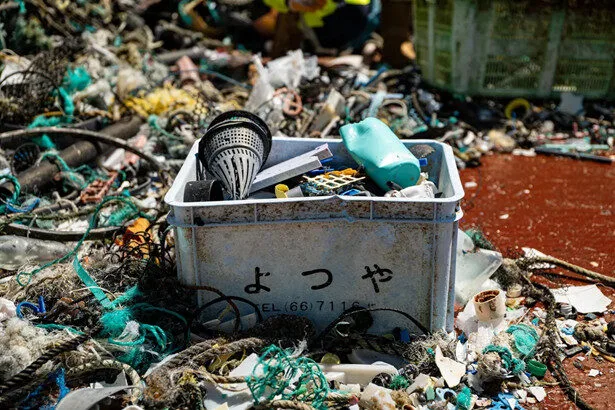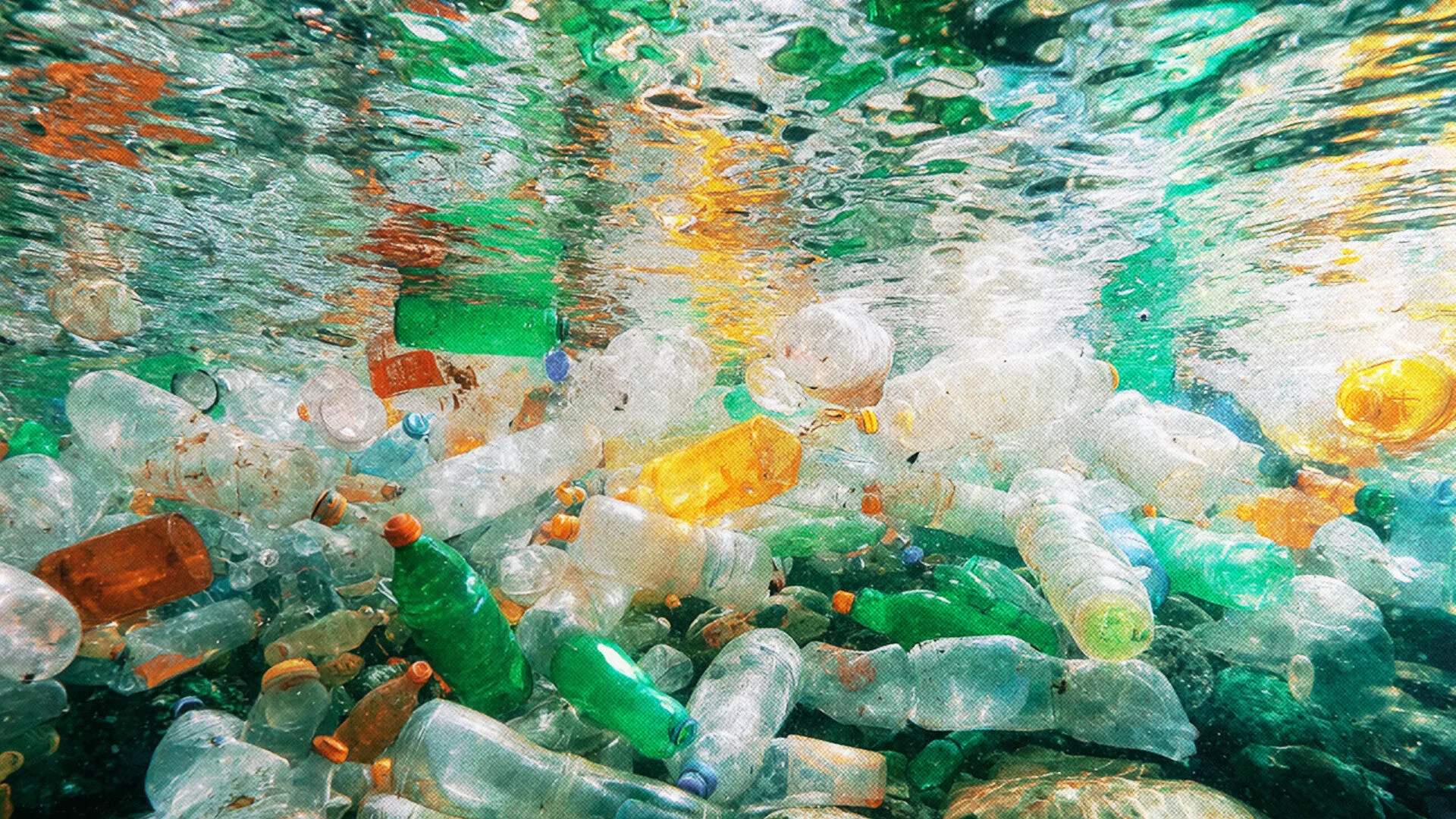7 minutes reading time
- Responsible investing
In 1907, Belgian-born chemist Leo Hendrik Baekeland changed the course of modern materials. Working in his New York Yonkers laboratory, he combined phenol and formaldehyde under heat and pressure to produce a substance that was strong, durable and easy to mould. He called the product Bakelite, after himself, and named the category plastic.
Baekeland had already struck gold once. His earlier invention, a photographic paper called Velox, made him a millionaire when he sold it to Eastman Kodak. But it was Bakelite that proved his true breakthrough: a material that reshaped modern life, laying the foundations for the plastics industry that would follow.
The father of plastic: Leo Hendrik Baekeland
Source: ThoughtCo.com
Since then, Bakelite has made way for an enormous range of plastic types. Because of its properties and myriad uses, the volume of plastic produced has increased relentlessly, to over 400 million tonnes in 2024, leading to surging plastic waste generation and environmental mismanagement.
Over the last decade, for example, fast fashion – with its heavy use of synthetic fibres – has become a major contributor to plastic waste. Each year, the textile industry produces 92 million tonnes of waste, around 69% of which is synthetics.1 Along with e-commerce packaging, fast fashion is one of the fastest growing sources of plastic waste.
Around a million tonnes of plastic enters our oceans every year

Source: theoceancleanup.com
As plastic degrades, it fragments into micro- and nano-plastics, which harm ecosystems globally. Microplastics have been found in ice samples in the Antarctic and the deepest ocean trenches.2 The plastic lifecycle also intensifies climate change, through emissions from oil and gas extraction, production and waste processing.3 Further, microplastics pose significant health concerns, including heightened cancer risks, cardiovascular disease and reproductive issues. One report estimates we could be eating 150,000 plastic particles, or the equivalent of 12 plastic shopping bags, every year.4
Managing plastic waste has been notoriously difficult. Most single-use packaging is engineered for performance, not recyclability, and multilayers, dyes, labels and laminates defeat sorters and degrade polymer quality. Contamination from food, organics and toxins adds cost and safety risk, while strict food-grade rules and non-intentionally added substances can limit the use of recycled content. On top of this, the price of recycled material is often higher than plastics made from virgin resin, particularly when oil prices are low, making it difficult to create sustainable markets for feedstock derived from recycled plastics.
In Australia, the national plastics recovery rate is around 14%, with 13% recycled and 1% used for energy recovery through pyrolysis or incineration.5 Of the recycled waste, around 33%, or 145,000 tonnes, is exported while the rest is processed locally.
In many jurisdictions, including Australia, a particular challenge is creating demand for products with recycled content. Government support frequently falls short of promises to the industry. Federally, the Environmentally Sustainable Procurement Policy directs entities to buy goods with ‘recycled content’, with compliance required for government departments, agencies and prescribed corporate Commonwealth entities.6 However, scope is limited by value thresholds, overseas exclusions and exemptions.7
The NSW Government commits departments to buy recycled on an ‘if not, why not’ basis, but allows frequent departures on the basis of cost.8 Similarly, Victoria’s Recycled First policy mandates that projects and tenders show how they will optimise recycled materials, but within existing standards, and permits explanations of limiting factors like price or availability.9
Opened in 2025, the iQRenew Plant in Kundle Kundle (NSW) can process 14,000 tonnes of soft plastic waste annually

Source: abc.net.au
Having said all this, breakthroughs in recycling are occurring. A recent study by Northwestern University found that a new, low-cost nickel catalyst selectively breaks down polyolefins, the single-use plastics that make up nearly two-thirds of global plastic consumption. It can handle large volumes of unsorted waste, converting it into oils and waxes for upcycling into lubricants and fuels. The catalyst is reusable and tolerates plastics contaminated with PVC, a toxic polymer that notoriously makes plastics ‘unrecyclable’.10
Global action frustrated by fossil fuel producers
In March 2022, delegates from 175 nations agreed at the UN Environment Assembly to negotiate a legally binding treaty addressing the full life cycle of plastics, from design and production to disposal.11 About 100 countries pushed for limits on production, reducing toxic chemicals, and cleanup and recycling. However, a number of countries that produce plastic, those that produce oil and gas, and around 300 companies in the Business Coalition for a Global Plastics Treaty, including Coca-Cola, PepsiCo and L’Oréal, firmly opposed strict limits on plastic production, hampering progress.12
In August 2025, countries met in Geneva to finalise the treaty. The conference, which observers claimed was overwhelmed by fossil fuel and petrochemical lobbyists, failed to agree on a text.
“Despite the fact that the vast majority of countries agreed on the need to cut plastic production… a small group of petro-states… sabotaged each round of talks by insisting on consensus to block ambition, and threatening to trap negotiations in procedural debate if Member States ever called for a vote.”
Statement by the Global Alliance for Incinerator Alternatives13
The collapse of the Geneva talks leaves the prospect of progress in addressing plastic pollution decidedly unclear. There is no current timeline or action plan for next steps.
A better ERTH
ERTH Climate Change Innovation ETF invests in a number of companies at the forefront of plastic waste management. These include:
- TOMRA Systems ASA (OSL: TOM): a global leader in reverse vending and automated sorting systems.
- WM Corporation (NYSE: WM): recycles plastics through materials recovery facilities that use optical sorting and quality control to produce PET and HDPE bales for processing.
- Clean Harbors Inc (NYSE: CLH): collects, segregates and treats contaminated plastics, including lab packs and industrial packaging, using solvent recovery, fuel blending and high-temperature incineration with energy recovery.
In 2025, Betashares worked with index provider Solactive and sustainable data specialist Minerva Partners to amend the negative screens applied to the Solactive Climate Change and Environmental Opportunities Index (Index), which is tracked by ERTH.
Commencing in August 2025, the Index explicitly screens to exclude companies that generate revenues from the manufacturing of fossil-based synthetic polymers used as commodity plastics, including polyethylene (LDPE, HDPE), polypropylene (PP), polyethylene terephthalate (PET), polyvinyl chloride (PVC), expanded polystyrene (EPS) and polyurethane (PU) foams.
What’s needed
Plastics reshaped modern life but, with production now exceeding 400 million tonnes a year, they overwhelm waste systems and threaten the environment and human health.
Global negotiations to address plastic waste have stalled, but progress cannot wait on consensus. Policy needs to move upstream as well as downstream: phasing out the most wasteful single-use items and multilayer formats, expanding deposit-return schemes, and applying extended producer responsibility (EPR) levies that reflect full environmental costs.
At the same time, incentives are required to fund alternatives, including standardised reusable packaging systems and washing logistics. Steps should be taken to introduce minimum recycled-content rules that reward genuinely recyclable designs, that scale collection, sorting and safe reprocessing, and that strengthen traceability and align labelling. Government procurement policies that prefer reusables and recycled content should also be applied without exemptions.
Investors have a role too. By backing solution providers and avoiding commodity fossil-based polymer producers, as reflected in ERTH’s approach, they can help shift capital towards a more sustainable economy.
There are risks associated with an investment in ERTH, including market risk, international investment risk, sector risk and non-traditional index methodology risk. Investment value can go up and down. An investment in the Fund should only be considered as a part of a broader portfolio, taking into account your particular circumstances, including your tolerance for risk. For more information on risks and other features of the Fund, please see the Product Disclosure Statement and Target Market Determination, both available at www.betashares.com.au.
Sources:
2. https://cleantechnica.com/2023/03/15/can-the-oceans-survive-an-unprecedented-influx-of-plastics/
6. https://www.dcceew.gov.au/sites/default/files/documents/esp-policy-fact-sheet.pdf
10. https://cleantechnica.com/2025/09/03/plastic-recycling-not-requiring-sorting-could-be-coming/
11. https://www.unep.org/inc-plastic-pollution
13. https://www.no-burn.org/ambitious-countries-stand-strong-refuse-weak-plastics-treaty/


